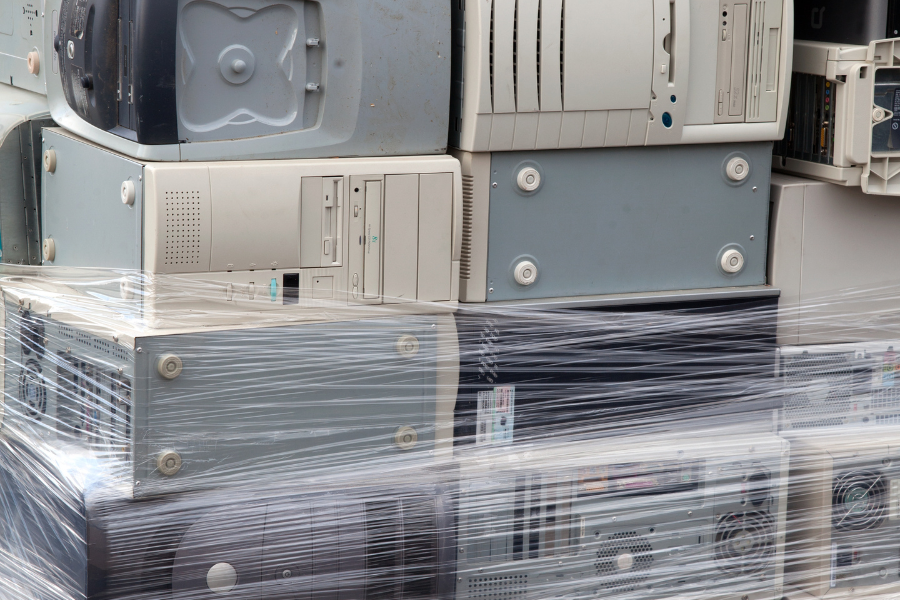
RecycleSoft provides applications for managing inventory, weighing shipments, tracking driver locations and several other necessities for ITAD companies. | Huguette Roe/Shutterstock
When the CEO of electronics reuse and recycling company R3eWaste decided to license the firm’s operations management software to the industry at large, he recognized that no competitors would bite if R3eWaste still used it.
That was one impetus for closing the ITAD and e-scrap recycling company and pivoting into the software business.
“For obvious reasons, no one in the e-waste industry is going to buy it if the person that owns the software is a competitor,” Graham Wollaston, CEO of R3eWaste, told E-Scrap News.
Any processors considering licensing the software would fear their competitor could abuse its database administration power to access their data, he noted. That meant processing used electronics and selling the software “could not co-exist,” he said.
The resulting software-only company, called RecycleSoft, is a rare example of a software provider with years of experience directly operating an electronics reuse and recycling business.
Wollaston explained that the knowledge gained running facilities helped inform the creation of the Recycling Operations Management System (ROMS) suite of software products, which handles everything from accounting and employees’ timecards to tracking devices through reuse, parts harvesting and recycling processes.
Pivoting away from processing
Based in Phoenix, R3eWaste had processing facilities in that city; Austin, Texas; and Tucson, Ariz. Wollaston founded R3eWaste in 2016. Earlier, in 2001, he founded ScrapComputer.com, a company he sold in 2012.
Wollaston began working on recycling industry software 22 years ago, around the time he started ScrapComputer.com. With a background in software development, he began by writing the code himself, although for years now he has relied on software teams in India and Eastern Europe to develop the software for him, he said.
After six iterations of the software, the result today is about 2.3 million lines of debugged and in-production source code, he said. R3eWaste used it for nearly all its functions, Wollaston said.
“It’s very robust. It was being used in R3eWaste for the last 8 years,” he said.
But late in 2022, the company decided to move out of material processing. The lease on the Phoenix plant was coming up for renewal, and the new property owner wanted to double the rent, he said. Additionally, he noted that the business faced more and more rules and higher costs over the years; simply maintaining R2 certification was getting more and more expensive, for example.
So the company closed three processing plants, laying off 32 people, and became a software-only company with a virtual office. Seven of those 32 people were then re-hired by the new software business, RecycleSoft, because of their institutional knowledge of ROMS and the company’s need for a support network to help customers get up and running, Wollaston said.
Launching the software
The core of the platform is ROMS, and a number of multi-device apps feed into ROMS, he said. The suite includes applications (including apps for mobile devices) for managing inventory, wiping data and producing certificates, selling used electronics on e-commerce sites, weighing shipments, performing double-entry accounting, recording employees’ hours, tracking driver locations, maximizing vehicle route efficiency, producing environmental impact reports for customers, performing mass email blasts and more.
“I have seen the other offerings and they are shiny, new and cover 40% but still require use of spreadsheets for the other 60%,” Wollaston said. “We do 100% – not a single spreadsheet required.”
RecycleSoft officially launched at the International Secure Information Governance and Management Association (i-SIGMA) Conference, which was held in Las Vegas in late March. The first adoptees are in the paper shredding industry, which don’t need 90% of what ROMS does, making them quick and easy to get up and running, he said.
RecycleSoft is now looking to take on one larger player. Wollaston is confident the system is designed for the complex business logic of the industry. A software-only company may not understand that complexity when entering the ITAD and e-scrap market.
For example, ROMS continually evaluates and scores clients based on the value of electronics they’re providing, the difficulty sorting the material and distance that has to be driven to collect their material. That score could allow staff to prioritize their pickups.
“If I’m just a software developer and have never been in the business, that sort of thing would never occur to me,” he said.
More stories about processors
- Australian metals company rebrands, builds Texas plant
- E-scrap buyer launches AI to recognize circuit board grades
- Company debuts battery-containing device shredder


